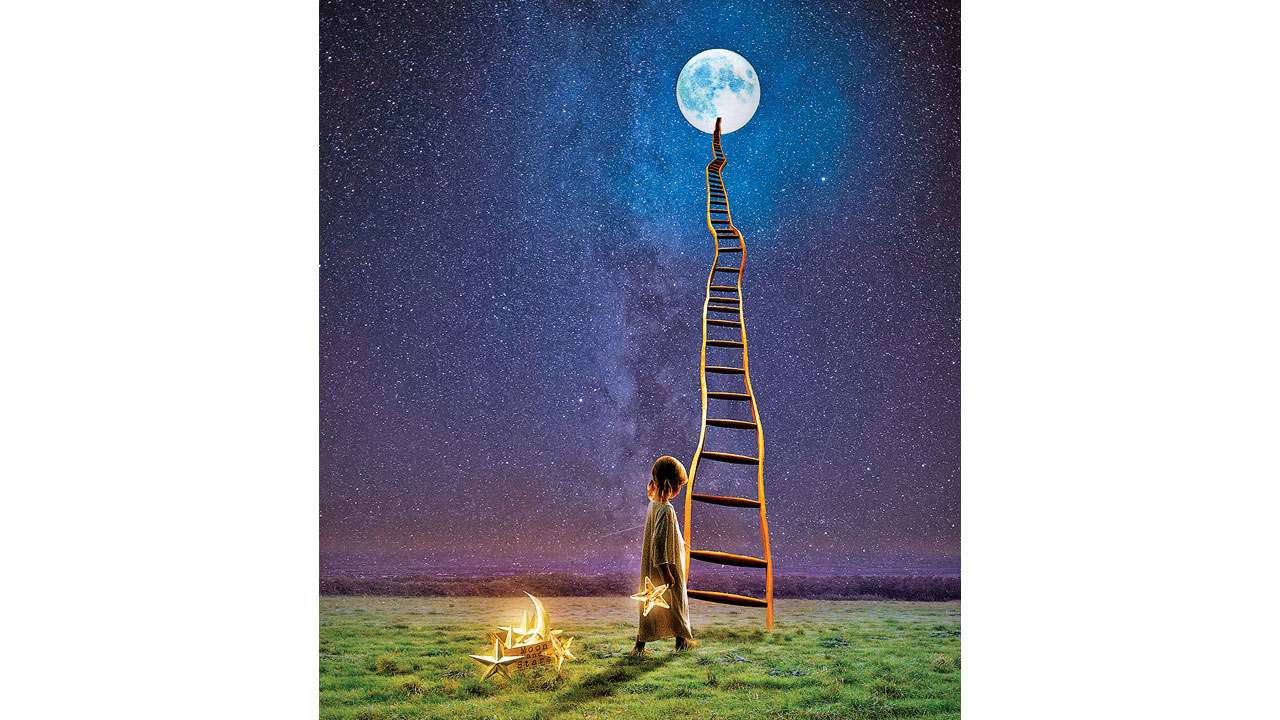
The Indian boy felt like a fish out of water in his New York school. He was the butt of jokes. Loneliness made him morose. Until the day he created a best friend for himself. This “friend” was dark, wore a peacock feather in his hair, and played the flute. Bubbling with laughter, affection, even mischief, he accompanied the boy everywhere. Today, that lonely boy is an ebullient Bharatanatyam artist. When he dances about Krishna, he is not describing a god, but celebrating a childhood bond. His long-ago “playmate” must have taught him to be lighthearted, to connect with the world.
This dancer’s experience is really neither singular, nor new. In an old folktale, doesn’t a mother tell her young son not to be afraid of taking the cattle into the forest, because Krishna was always there to protect him? The boy’s implicit trust made him “see” the Blue God as his fellow cowherd. Yes, imagination can transform illusion into reality, it can make you feel strong in solitude.
I also remembered how my little daughter “brought” a kitten into the house. No one could see the kitten, but we could certainly see the child playing endless games with the creature. She refused to eat unless the kitten was fed too. When a teasing uncle asked her to show him the kitten, my daughter picked up a piece of paper, drew some squiggles and thrust the “portrait” into his hands. “That’s just scribbling, where is the kitten?” the uncle persisted. The child looked at him pityingly and answered, without a blink, “Kitten won’t sit still. She ran away.”
Psychologists will say that imagination is an escape route, but also a character-building tonic. Scientists agree that more than minute research and methodical calculation, it is the eureka moment that signals discovery.
Philosophers see cognitive imagination as the chariot of fire soaring beyond reason’s boundaries. Mystics deem it spiritual transcendence. Poets have always seen imagination as the power of survival for humankind and planet earth. Doesn’t the Vedic poet imagine wellbeing – not only for humankind – but for everyone walking on two legs or more, as also for every blade of grass, every grain of sand, every drop of water – in fields, forests, mountains, valleys, rivers and oceans? So did the Greek or Norse or Egyptian bard.
Indigenous people in every continent breathe the same wisdom. Joy Harjo, native Indian US Poet Laureate, asks us in her haunting verse to listen to the stories of the stars, moon, sun, wind, earth, trees and animals, in order to “remember that you are all people and all people are you. You are the universe and this universe is you. All is in motion, is growing, is you”. Without such a magnificent, all-encompassing vision, can we save the planet from extinction?
And yet Plato, the greatest thinker-poet of them all, dismissed poetry from his ideal Republic. Why? He thought that art feeds the fickle emotions and thereby weakens reason, the faculty supreme. Disagreeing with his guru, Aristotle declared that art does not debilitate, but restores balance by purifying our emotional landscape. Springing from the imagination, art heals the mind. And how did Aristotle arrive at this cathartic insight? By watching live theatre performances where Aeschylus, Sophocles and Euripides reimagined the world.
We all know that imagination is a process where we integrate what we learn with what we experience. Analyses prove that accumulation of knowledge is meaningless, without the ability to apply that knowledge to understand the issues we face, resolve the problems we encounter. Forget dreaming poets and painters. Where would Edison be minus imagination? How could Steve Jobs have revolutionised the universe of technology sans creativity?
Old world cultures used an effective and simple method of oral transmission to stimulate the imagination, particularly in the young. What else but storytelling? They created worlds with words. Grandma says, “Arjuna aimed his arrow at the bird on a distant tree. The teacher asked him what he saw. The boy answered, ‘Bird’s eye’.” An old uncle may begin, “The monkey told the crocodile who was carrying him into the river, “Friend, I am happy to be your lunch, but if you take me back to the shore I will get my heart from my home on the tree – that’s the sweetest part of me you shouldn’t miss.” Rama thunders in mother’s bedtime tale, “The sun may fall from the sky, waters may vanish from the ocean, but I will not go back on my word.”
From concentration to craftiness and morality, such images—both practical and ideal—inspire each generation to thrive and to progress. And finally, I wonder: because we can imagine a better world, can we actually create it...
One day?
The author is a poet, editor and a translator